- Home
- Rose Tremain
Sadler's Birthday
Sadler's Birthday Read online
Contents
Cover
About the Author
Also by Rose Tremain
Dedication
Title Page
Chapter I
Chapter II
Chapter III
Chapter IV
Chapter V
Chapter VI
Chapter VII
Chapter VIII
Copyright
ABOUT THE AUTHOR
Rose Tremain is a writer of novels, short stories and screenplays. She lives in Norfolk and London with the biographer Richard Holmes. Her books have been translated into numerous languages, and have won many prizes including the Whitbread Novel of the Year, the James Tait Black Memorial Prize, the Prix Femina Etranger, the Dylan Thomas Prize, the Angel Literary Award and the Sunday Express Book of the Year.
Restoration was shortlisted for the Booker Prize and made into a movie; The Colour was shortlisted for the Orange Prize and selected by the Daily Mail Reading Club. Rose Tremain’s most recent collection, The Darkness of Wallis Simpson, was shortlisted for both the First National Short Story Award and the Frank O’Connor International Short Story Award, and her latest novel, The Road Home, was shortlisted for the Orange Prize. Three of her novels are currently in development as films.
ALSO BY ROSE TREMAIN
Novels
Letter to Sister Benedicta
The Cupboard
The Swimming Pool Season
Restoration
Sacred Country
The Way I Found Her
Music & Silence
The Colour
The Road Home
Short Story Collections
The Colonel’s Daughter
The Garden of the Villa Mollini
Evangelista’s Fan
The Darkness of Wallis Simpson
For Children
Journey to the Volcano
For Jon
SADLER’S BIRTHDAY
Rose Tremain
I
Jack Sadler woke up in what had once been the Colonel’s room. Now, like the rest of the big house, it was his. They’d had a wing each, the Colonel and his wife Madge; they liked to meet at mealtimes in the dining room, listen to the news together, or play a game of Gin Rummy, but several doors divided them while they slept.
Colonel Bassett had been a tidy man. Came from his army training, so he said. Never so much as a hair out of place on him except, as he got older, in his ears where they sprouted untended. It was always a mystery to Sadler why so meticulous a man had allowed this one part of himself to become so very overgrown.
Sadler looked round the room. The Colonel had been very fond of cupboards. He had put them in all over the house, so that whenever he saw something lying around, he could be sure to be near one and just pop it away out of sight. At least once a year he’d turned out all the cupboards and made inventories of what they held.
It was cold in the room, so cold that Sadler lay there without moving, wrapped in his blankets and his two eiderdowns, lay trapped by the morning cold, cursing himself for not leaving the fire on all night. He thought to himself, never minded an East Anglian winter when I was a lad. Quite enjoyed an excuse to wear my green balaclava. But now. He was seventy-six, give or take a day or two (he knew his birthday was coming round soon, one day this week or next – he’d have to look at the calendar) and the cold seemed to wake up all the little aches and pains that dozed in his joints, even set the bile in his stomach trickling backwards into his throat.
Don’t get up, he thought. Don’t move. Lie here all day in the warm bed. Just clamber out for a second or two, long enough to turn on the fire, then back into the warm. Lie there, arms straight down, waiting for the fire to come red. Wait till the room’s nice and warm, then prop yourself up with another pillow, put your dressing gown on and your glasses and have a little read …
He lay rigid. Cowardly old sod, he thought. Get the bleedin’ fire on or you’ll be trapped like this all day. So silly when it wouldn’t take more than a few seconds, just the time it takes to walk four and a half paces.
Then he remembered the dog. He looked at his clock, saw half past seven and knew that by now the dog would be scratching at the kitchen door, desperate for a pee but so well trained poor old thing he only did it on the floor if he had to. Sadler never had known what kind of dog he was: brown wiry body, black eyes and no tail to speak of, just a small woolly tuft to wag. From behind he looked like a little brown sheep. One hundred and five he was by human computing and except at moments like this Sadler was glad of his company. He often wondered what it would be like to be totally alone with not so much as a yap to break the silence and no one to read the paper to. He sincerely hoped he would die before the dog, recognizing at the same time that this thought was a bit Colonelish. Because the Colonel always used to say, ‘You know, Sadler, the only thing that’s bearable about death is that I’ll die first, before Madge.’ And then in the end Madge and the Colonel had died on the same day, Coronation Day.
Sadler sat up in bed and fumbled about for his dressing gown. At the window, heavy chintz curtains held out the sunlight. March morning, cold as January, but clear as a jewel in the grounds of the great house. Sadler switched on the fire, resisted the impulse that drove him back to bed, went to the window instead, big south window where the merest twitching of the curtains sent sunlight jumping over the sill.
Everything he could see from this window belonged to him: a wide lawn, cut in two by the drive and sweeping leftwards past the house, right round to the north side. Beyond the lawn, an old yew hedge like a line of sentinel shoulders hunched at the gate of a wood of evergreens. To the right of the lawn, the apple orchard, walled on one side but straggling over rising ground to a meadow. At the bottom of the meadow, a stream tunnelling a windy course among dense rushes, never flowing fast enough to stay clear but in late spring its banks gaudy with kingcups. This morning everything was white with frost. Much prettier than snow, Sadler always thought, much more delicate. But spring was such a fickle whore. Daffs couldn’t push up innocent shiny buds without she sent a frost to snap them off.
The dog was whining now, would be crossing his little legs if he could. Sadler heard the whining as he came barefoot down the wide stairs and thought, time I took him to the vet again to see about his worm. He seems happy with his worm, though. Fond of being hungry all the time, makes him feel young again I wouldn’t wonder. Funny things, worms. Worm lies trapped in his belly, eating for him, eating and growing fat and the dog’s as thin as a fox.
It was too late when Sadler opened the kitchen door. The dog sat silent, reproachful, looking at the puddle he’d made. Sadler never scolded the dog, couldn’t bear to do it any more. He patted the dog’s little head, opened the door to the garden and sent him trotting out into the cold. Five minutes and he’d be whining again, asking to be let in.
Sadler sat down at the kitchen table, wondering how many countless mornings had there been, just like this one, sitting there thinking to himself, twenty years ago I’d be up and dressed by now, smart enough in my morning uniform – black trousers, striped cotton jacket, clean white shirt and one of the Colonel’s old ties – chivvying Vera who moved so ponderously about the kitchen, watching the clock to be sure to sound the gong on the dot of eight. Then waiting there, standing almost to attention, for the Colonel to come down at one minute past.
‘Good morning, Sadler.’
‘Good morning, Sir.’
Handing him The Times as he went into the dining room, following him in, serving his eggs or his kidneys or his sausages, pouring his strong coffee and then retiring with a nod and a ‘thank you, Sadler’. Back to the kitchen then, watching Vera’s thin hands decorating the butter balls with a
sprig of parsley, putting the finishing touches to Madam’s tray. What a neat little breakfast she took every day: lightly boiled egg, lightly toasted bread, a little pot of china tea and a slice of lemon.
‘Ready, Vera?’
‘Yes, Mr Sadler.’
Lifting the tray up with pride, it looked so nice with its clean linen traycloth (Madam always bought her traycloths from the Ladies Work Stall at the Hentswell fête, they were so finely embroidered), carrying it up the wide staircase to her room. And there she was, sitting up in bed in her bed-jacket, her rouge on already, smiling at him.
‘Good morning, Sadler.’
‘Good morning, Madam.’
Still smiling. ‘Is the Colonel down?’
‘I’ve just served his breakfast, Madam.’
No one to carry a tray to any more. Dead and gone now, the smiling face. And he’d never known it when it was young and pretty. Lined and rouged already when he had taken up service under its kindly eye. Older than the Colonel, his Madge. Twenty-six she’d been as the century turned and she’d gone on her father’s arm to St Margaret’s Westminster. And her groom only twenty, not long out of school, a young lieutenant with hardly the need to shave more than twice a week. What a wedding! A thousand lilies at the altar alone. Friends of royalty in the congregation, quite a crowd in Parliament Square to see the bride and groom come out. Madge remembered her wedding day all her life, just as if it had been yesterday. She told Sadler that her mother had spent forty-three shillings a yard on ivory satin for her dress and when she’d put it on and her maid had handed her the bouquet she’d felt as good as a queen.
The dog was scratching at the door.
‘Come on then,’ Sadler called, ‘never seen a door before?’
He chuckled, got up slowly and shuffled over the stone floor to let the dog in. It went at once to its warm mat by the old Aga, lay down and look up at Sadler who remembered the puddle and cursed.
‘Incontinent little rat!’
The dog wagged its clump of a tail, might have smiled if it could have.
‘Come on then, sod you,’ Sadler said, ‘better mop it up.’
He found an old cloth under the sink, ran a cold tap on to it and wrung it out. His back hurt as he bent down to wipe the floor. What a dose of humiliation old age could give you. What a creaking, stinking, barnacled old wreck life made of the boat in which your soul was forced to sail. Might live another twenty years in this ghastly old body, Sadler thought as he pushed the cloth to and fro. ‘But all I can say, God, if you’re there,’ he said aloud, ‘is I hope not.’ He straightened up painfully, went back to the sink and rinsed out the cloth. Then he crossed to the Aga and the dog looked up.
‘If you think you’re going to get a meal, you’re wrong, friend,’ he said. He would have patted the dog, to give it reassurance that he cared about it, but he couldn’t bear the thought of bending down again. ‘Later,’ he said, touching the dog with his foot, ‘just make myself a cup of tea and then I’ll get you something. You be a good boy.’
Sadler had come to the house as the Second World War began. He was thirty-nine then and fit as any who boarded the troop ships for France, but he limped just a little as he had done from birth, enough, they said, not to have to fight. Late in September he came down to London from a job in Scarborough, spent a day or two in a boarding house in the Charing Cross Road and then caught a train for Norwich.
He was met by the Colonel’s chauffeur in the Austin Seven. Cold autumn day in 1939. A winter wind blowing through Norfolk, straight from Russia.
‘You must be Mr Sadler.’
‘Yes indeed. Cold isn’t it?’
‘Very cold, Mr Sadler. My name’s Wren, Sir, the Colonel’s chauffeur.’
Smart little cap, nice kid gloves and a lovely shine on his worn boots, Wren sat bolt upright at the wheel, driving as carefully as he dressed. Must be sixty-five, Sadler thought, sitting beside him. More at home with a pony and trap probably than with the Austin. Less than ten miles to do and it took them best part of an hour.
‘She’s a good little car,’ Wren said as they set out, ‘but she don’t go.’
Sadler pondered this saying for most of the journey, sitting silent, smiling to himself, looking out at the wide fields. Wren, intent on the road, liable to slow almost to a halt each time a car came the other way, only spoke a couple more times. Once he said ‘Did you have a good train journey, Mr Sadler?’ and Sadler, who liked trains, replied ‘Oh most enjoyable, thank you.’ Then, as they neared the house, Wren took a nervous hand off the wheel to point ahead to the gates.
‘There you are, Mr Sadler. The house of course is hidden from the road.’
They swept into the drive, Wren full of daring now that they were off the public road. Sadler put his hat on, thought nervously that it wouldn’t be long till dinner-time and of course Madam would expect him to serve. There might even be guests and who knew in what state of preparedness he would find the kitchen staff.
Leaves flew like a flock of golden sparrows as they drove down an avenue of beech, and then there at last was the house, perfect copy, so the history books ran, of one of Queen Victoria’s favourite residences, yellowish in its stone skin with a gleam of sun on it.
‘Well,’ said Wren, ‘there she is.’
The house he meant, did he? Or was it Mrs Bassett with a nice smile on her lips coming out of the porch? There she stood watching them as Wren brought the car to a stop, got out quickly and stood to attention. Sadler fumbled with his door handle, wished he’d paid the landlady in Charing Cross to press his suit, stepped out on to the gravel and into the orbit of the smile.
‘Sadler.’
‘How d’you do, Madam.’
‘Did you have a pleasant journey?’
‘Most enjoyable, thank you.’
‘You’re not too tired, then?’
‘Oh no.’
A voice from within. ‘Did I hear the car, Madge?’
And then the Colonel materialized, shoved a wide red hand into Sadler’s and smiled the smile that had earned him a reputation for frankness in the regiment, the smile that had stiffened and narrowed just a little since the day, forty years before, when it had lighted Madge’s wedding.
They guided him in, leaving his suitcase in the car and Wren, still stiff and straight like a bowling pin in the middle of the drive. Into the lofty hall, the meeting point for numerous doors and passageways. To the right, Sadler glimpsed a comfortable, heavily curtained room where a coal fire burned, the shut door on the left he guessed would be the dining room. But on of course, away from the splendour, leaving the Colonel behind, to the furthest passageway, cold as they entered it, that led to the kitchen and the servants’ hall.
Sadler heard a chatter of voices – Vera and her kitchen maids like a scrawny chicken and her brood of two. But as Sadler and Madge entered they stopped all movement and Sadler found that he was looking at three apprehensive faces. He smiled and heard Madam say ‘This is Mr Sadler’, held out his hand to the cook who wiped hers on her apron and shook his limpiy. The kitchen maids bobbed and Sadler felt a blush coming to his face, remembered bitterly how his mother always had her curtsey ready for Milady, used to practise it in front of her looking glass …
‘My cook, Mrs Prinz, who likes us to call her Vera, and this is Jane and Betty who help her in the kitchen.’
His army. This thin, tired woman with her pert helpers.
‘Pleased to meet you,’ said Vera.
‘You must be tired.’ From Madam.
‘Oh no.’
‘Come and see your room and then I expect you’d like to unpack.’
Sadler remembered his suitcase.
‘Thank you.’
He followed Mrs Bassett back down the cold passage, through a door and up a flight of stairs, green linoleum on them. Out on to a landing, carpeted with coconut matting, then past her while she stood at another door, holding it open for him, into such a nice little room, not large by any standards but wonderfull
y neat.
‘Do you think you’ll have enough room for your things?’
‘Oh yes.’
‘You’ll find a rug in the wardrobe if there’s not enough blankets on your bed.’
‘The nights are getting cold in this part, I wouldn’t wonder.’
‘I’m afraid so. It’s been such a wonderful summer, but it’s over now.’
Sadler was caught by the measure of despair in her voice, looked at her and thought: how will war touch us here? And into his head came this odd picture of the chauffeur falling down where he stood so smartly to attention, knocked down like a skittle and his body rolling away under the car.
‘Wren will bring up your suitcase.’
‘Thank you, Madam.’
‘We dine at eight fifteen.’
‘Very good.’
‘You may wear a short coat to serve in the dining room, except when we entertain.’
And then she was gone, leaving him to his room. He looked all round it, noting the simplicity of the things in it and finding them pleasing. Then he saw the picture above his bed, a gentle pastoral scene, belonging more correctly in a nursery – two fat little children, boy and girl, picking daisies in some wonderland of a meadow. Sparrows and thrushes, fat too and friendly, hopping about near them and in the distance an old water wheel. Sadler laughed. The room reminded him of a room he’d shared with his mother countless years back, the year they’d gone to Milady’s house. Put to bed at six without much in the way of supper, he’d lie straight as a stick waiting for his mother to finish work and get into bed beside him. She was usually there by eight for she’d be up again before dawn. He remembered how when she climbed into bed he’d turn towards her, pretending to roll over in his sleep, and feel the warmth and smell of her body soothing him. There’d been a child’s picture in that room too. His mother had said Milady had put it there especially for him. But he didn’t believe that and one evening, before his mother came up, he took it off the wall to see if there was a pale patch on the wall behind it and there was. There was even dust on the wire.

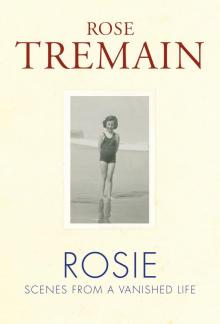 Rosie
Rosie The Garden of the Villa Mollini
The Garden of the Villa Mollini Merivel: A Man of His Time
Merivel: A Man of His Time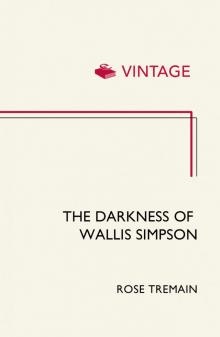 The Darkness of Wallis Simpson
The Darkness of Wallis Simpson Earth
Earth Sacred Country
Sacred Country The Swimming Pool Season
The Swimming Pool Season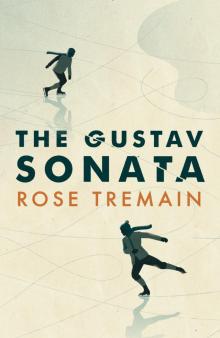 The Gustav Sonata
The Gustav Sonata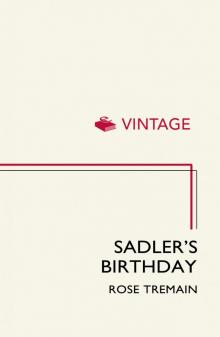 Sadler's Birthday
Sadler's Birthday The Cupboard
The Cupboard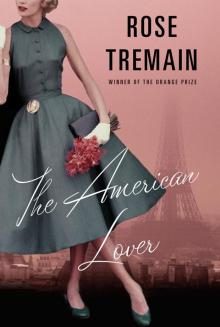 The American Lover
The American Lover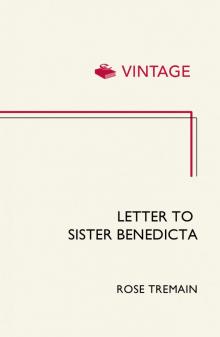 Letter to Sister Benedicta
Letter to Sister Benedicta Evangelista's Fan
Evangelista's Fan Restoration
Restoration The Road Home
The Road Home The Colonel's Daughter
The Colonel's Daughter The Way I Found Her
The Way I Found Her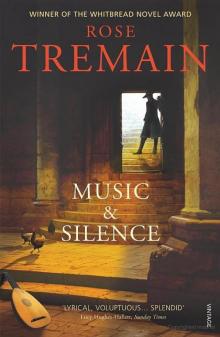 Music & Silence
Music & Silence